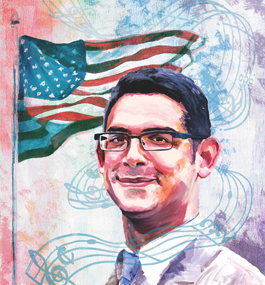Turning Points
That New American Salute

Alyssa Carvara
by Nicholas Alexander Brown ’10
Though I had come out as something-other-than-straight to various friends in high school, when I arrived at Brandeis as a music student I still did not have a clear sense of my identity. For years, I had convinced myself I was bisexual. I simply did not have the courage to be a gay man.
Compounding my dilemma was the fact that I served in the Army National Guard. The “don’t ask, don’t tell” policy was still in effect for American military personnel. Serving my country felt more important to me than expressing my personal identity. I decided I should hide my true self to avoid compromising my career.
As a result, I presented inconsistent versions of myself to loved ones, friends and colleagues. I was living a series of lies — a burden that weighed heavily on my mind and soul.
During my sophomore year at Brandeis, I was introduced to Leonard Bernstein’s “Songfest,” a little-known song cycle composed in honor of the American Bicentennial. In it, Bernstein sets American poetry to music for orchestra and six singers. Langston Hughes, e.e. cummings and Edna St. Vincent Millay are several of the 13 poets represented.
An unfinished Walt Whitman poem provides the text for the cycle’s fourth song, “To What You Said.” In the poem, Whitman grapples with his homosexuality, galvanized by the pain of seeing Civil War soldiers — some who were more than friends in his heart — fallen on the battlefield. Ultimately, Whitman embraces individuality as a true expression of patriotism.
Clearly, the Whitman poem struck a chord in Bernstein. And after one of my conducting mentors shared with me a YouTube video of a “To What You Said” performance, the song became central to my own yearning to live an open, authentic life.
Toward the end of my senior year, I was walking to my dorm room in Grad when I happened to notice an American flag flying high against the blue sky. Without warning, that sight shattered me. How could I suppress my own rights and identity yet defend those of my fellow Americans?
Around this time, I learned “To What You Said” in my studies with vocal instructor Pamela Wolfe and eventually performed it in recital. Singing the words “I introduce that new American salute” gave me the strength and comfort I needed to validate my emotions and emerge from hiding. I realized that to serve my country and my community I first had to accept myself.
By graduation, I had come out fully to my friends, colleagues and family. I was most amazed by the support I received from military colleagues. My heart was filled with so much pride and relief that I attended my senior formal in my dress uniform with my boyfriend — talk about feeling liberated!
When I got my master’s in musicology, I devoted my thesis to exploring Bernstein’s depiction of American social identity in “Songfest.”
The following autumn, I worked in the White House as an intern in the office of First Lady Michelle Obama. The day the “don’t ask, don’t tell” repeal went into effect, I was in tears as I walked through the Secret Service checkpoint to enter the East Wing.
My journey with “Songfest” continues at the Library of Congress, where I’m now a music specialist. This year, I helped organize the library’s LGBTQ+ Pride Month exhibition, which featured the Bernstein “Songfest” manuscript as part of its “treasures” display. It was the first time our national library had mounted an institution-wide exhibition marking Pride Month.
It was a powerful personal moment for me, one I’m not sure would have been possible if I hadn’t heard “To What You Said” at Brandeis.
Nicholas Alexander Brown ’10 is a music specialist at the Library of Congress, a conductor and musicologist, and a former Army bandsman. Reach him on Twitter @frenchhorn88.
